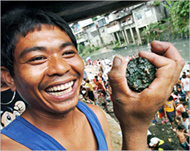Philippines truce with southern rebels
The Philippines military has reached an informal truce with a southern rebel group, allowing troops to concentrate on pursuing another separatist group, an official said.

Ben Loong, the governor of southern Jolo island, told government officials he helped broker the agreement with Habir Malik, who led Moro National Liberation Front (MNLF) forces in an uprising on Jolo earlier this month.
Fighting broke out between MNLF forces and government troops on the island in what rebels say was retaliation for previous operations by the military which killed local civilians, including children.
The wife and two children of an MNLF leader were among the civilians killed, but a military spokesman said they were caught in crossfire during a clash on 1 February that also left two soldiers dead.
“We cannot say it’s a ceasefire, but we call it a gentleman’s talk between the armed forces and the MNLF,” Loong said.
Malik, a follower of jailed MNLF leader Nur Misuari, led about 300 MNLF fighters supported by the Abu Sayaf in attacks on military outposts in Jolo earlier in February, triggering fighting that claimed the lives of 25 soldiers and 70 rebels.
More than 27,000 people have fled their homes due to the clashes.
Restraint
Although Malik’s base in the jungles outside Panamao town had been captured and his forces dispersed, he remains in hiding with many of his followers still at large.
|
“We cannot say it’s a ceasefire but we call it a gentleman’s talk between the armed forces and the MNLF” Ben Loong, |
Loong said he was able to contact Malik, with both sides agreeing to refrain from attacking each other.
The governor said he then spoke to an unnamed military officer who told him that “we will not go there [to Malik’s hideout] as long as they don’t attack.”
But Loong added the Abu Sayyaf “are a different story from the MNLF,” recalling that both Washington and Manila had linked the group to al-Qaida.
He also said: “We cannot blame the military if they are still having their military offensive… because there are so many Abu Sayyaf [members] who are being pursued by the soldiers.”
No fresh fighting
Loong told Social Welfare Secretary Corazon Soliman and visiting Senator Richard Gordon there had been no fresh fighting since soldiers overran an Abu Sayaf camp in the jungles outside of Indanan town in Jolo island on Thursday, killing about 10 of them.
The government has been cracking down on the Abu Sayaf after a spokesman of the group claimed responsibility for near-simultaneous bombings in Manila and the southern cities of General Santos and Davao on 14 February which killed as many as 12 people and injured some 100 others.
The Abu Sayaf said the 14 February bombings were in retaliation for the attacks on Malik’s forces.
Trillion dollar industry
Rebel groups, including Muslims and Communists, are reportedly concerned about the high level of corruption in government and that foreign investors will soon take full control of the region’s natural resources.
A supreme court ruling in December has given foreigners 100% ownership in the trillion dollar mining industry.
 |
|
Philippines has a trillion dollars of |
The government says the Philippines has untapped mineral wealth of over a trillion dollars, with the richest of provinces in the south and east, where both Muslim seperatists and Communist rebels are active.
Peter Wallace, analyst at a local think-thank, commenting on corruption has said: “There is now question that if corruption continues to exist from the local governments, it’s going to make it more difficult to sell to foreign mining firms … to invest in the Philippines.”